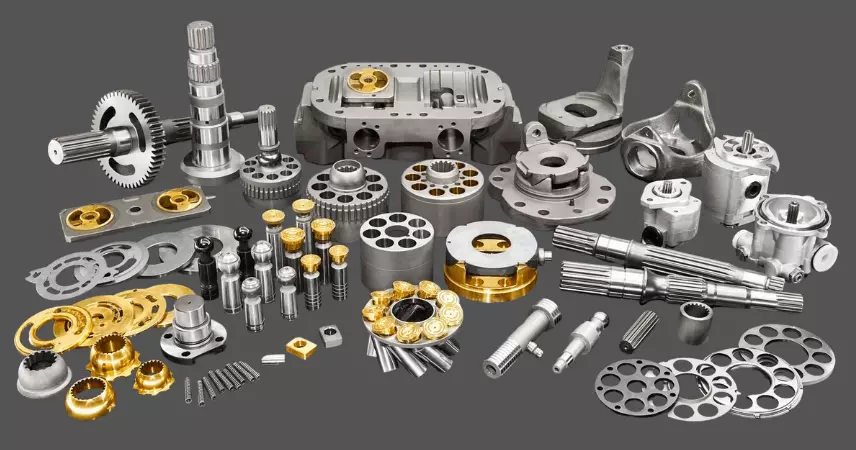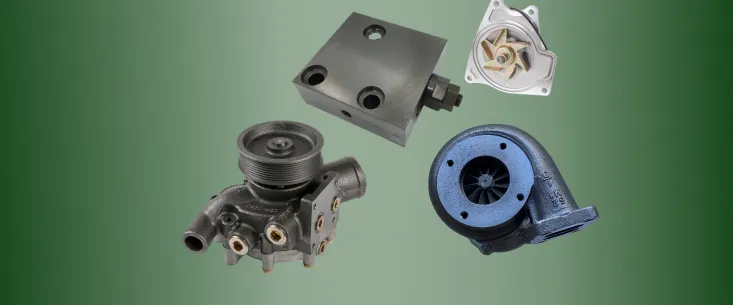+86-135 3388 0668
The Importance of Hydraulic Oil Pumps in Modern Machinery

In today's world, hydraulic systems power a vast array of machines, from construction equipment to automotive tools, and even aerospace machinery. One critical component at the heart of these systems is the hydraulic oil pump. Without it, the ability to harness and control hydraulic power would be nearly impossible. Whether you’re dealing with the massive hydraulic cranes used in construction, the powerful machines that drive factories, or the precision tools in medical equipment, hydraulic oil pumps serve as the lifeblood of these systems.
What is a Hydraulic Oil Pump?
A hydraulic oil pump is a mechanical device that converts mechanical energy into hydraulic energy by moving oil through a hydraulic system. The pump generates flow by creating pressure in the system, which in turn moves hydraulic fluid throughout the machinery. These pumps are essential because they ensure that enough pressure is built up in the system to perform work, whether it’s lifting, pushing, rotating, or any other mechanical task.

Hydraulic systems depend on the fluid’s ability to transfer power, and the oil pump is responsible for initiating this transfer. The oil, which serves as both the medium and lubricant, carries the force needed for the system to function effectively. Without the hydraulic oil pump, the system would simply be unable to perform its functions.
The Mechanics of Hydraulic Oil Pumps
The working principle of hydraulic oil pumps is relatively straightforward. At the core, these pumps create flow by drawing in hydraulic fluid, pressurizing it, and then pushing it out into the hydraulic system. However, the design of the pump and the type of fluid used can affect how the pump operates and how efficiently it performs.
The most common type of hydraulic oil pumps are positive displacement pumps. These pumps deliver a fixed amount of fluid for each cycle of operation, ensuring a constant flow and pressure. Positive displacement pumps can be further categorized into Gear pumps, vane pumps, and piston pumps, each of which has its own advantages depending on the application.
Types of Hydraulic Oil Pumps
Gear Pumps: Gear pumps are one of the most widely used types of hydraulic oil pumps due to their simple design and reliability. They consist of two meshing gears that trap oil in their cavities and force it into the system. Gear pumps are often used in applications that require a steady and continuous flow of oil, making them ideal for small and medium-sized machinery.
Vane Pumps: Vane pumps are designed with a rotor that holds several vanes. As the rotor turns, the vanes slide in and out, creating pockets that trap and push oil through the system. Vane pumps are known for their quiet operation and efficient performance, which makes them suitable for medium to high-pressure applications.
Piston Pumps: Piston pumps are highly efficient and capable of generating very high pressure. They use a series of pistons to move hydraulic fluid, making them ideal for high-performance machinery where maximum power and precision are required. Piston pumps are often found in applications that involve heavy-duty equipment, such as construction machines or industrial presses.
Each type of hydraulic oil pump has specific advantages and applications, but all share the same primary function: to create pressure that drives the fluid through the hydraulic system.
Why Hydraulic Oil Pumps Are Crucial for Machine Efficiency
The efficiency of a hydraulic system heavily depends on the performance of the hydraulic oil pump. When the pump operates smoothly, the system can function at its peak efficiency. Hydraulic oil pumps are responsible for maintaining the correct fluid flow rate and pressure, ensuring that machines can perform tasks like lifting, tilting, or moving with minimal energy waste.
The efficiency of the pump is directly related to the energy required to generate the flow. A well-designed, high-performance pump minimizes energy loss and helps reduce the overall operating costs of the machinery. By maintaining an optimal flow rate and pressure, hydraulic oil pumps also contribute to the longevity of other components in the hydraulic system, reducing wear and tear on parts such as cylinders, valves, and hoses.
Additionally, the pump's ability to adjust to different load conditions ensures that the hydraulic system can handle variations in power requirements. For instance, when a machine is under heavy load, the Hydraulic pump can adjust to provide more power, and conversely, when the load is lighter, the pump can reduce the pressure to save energy.
Applications of Hydraulic Oil Pumps
Hydraulic oil pumps are found in a wide variety of industries and applications. Below are some examples of where hydraulic oil pumps play a key role:
Construction Industry: Hydraulic systems are used extensively in Construction Machinery, such as excavators, cranes, and bulldozers. Hydraulic oil pumps in these machines are responsible for lifting heavy loads, controlling movement, and powering various attachments like hammers and drills.
Manufacturing and Industrial Equipment: Hydraulic systems power many industrial machines, including presses, injection molding machines, and automated production lines. The hydraulic oil pump ensures these machines operate smoothly, increasing production efficiency and precision.
Agricultural Equipment: Tractors and harvesters use hydraulic oil pumps to power attachments and perform various tasks such as lifting, plowing, and planting. The reliability of these pumps ensures that agricultural operations can proceed without delays.
Automotive Sector: In automotive repair shops, hydraulic oil pumps are used to power car lifts, presses, and other tools. These pumps ensure that repair and maintenance work can be completed efficiently and safely.
Aerospace Industry: Hydraulic systems are critical in aircraft for controlling various functions, such as landing gear, flaps, and brakes. The hydraulic oil pump ensures that these components receive the necessary power to function correctly.
In each of these industries, the hydraulic oil pump is integral to the smooth operation of the machinery. Without it, performance would be compromised, leading to inefficiency, downtime, and potentially costly repairs.
Optimizing Hydraulic Oil Pump Performance and Maintenance
While hydraulic oil pumps are built to be durable and long-lasting, they do require proper maintenance to ensure they continue to perform at their best. Proper care and attention can significantly extend the life of the pump, reduce the risk of breakdowns, and improve the overall efficiency of the hydraulic system.
Common Issues with Hydraulic Oil Pumps
Like any mechanical component, hydraulic oil pumps are prone to wear and tear over time. Common issues include:
Cavitation: This occurs when the hydraulic fluid inside the pump is not pressurized enough, causing bubbles to form and collapse inside the pump. This can lead to damage to the pump’s internal components and reduce its efficiency.
Contaminated Fluid: Dirty or contaminated hydraulic fluid can cause internal damage to the pump. Dirt, water, or other foreign substances in the fluid can lead to wear on the pump’s internal parts, decreasing performance and potentially causing failure.
Overheating: If a hydraulic pump is subjected to excessive heat, it can cause the oil to break down and lose its lubricating properties. This can result in poor pump performance and, in extreme cases, total failure.
Excessive Pressure: If the system is subjected to pressure beyond its rated capacity, it can cause the pump to fail. It’s important to ensure that the pump operates within its designated pressure range to avoid damage.
Regular Maintenance for Hydraulic Oil Pumps
To keep hydraulic oil pumps in peak working condition, regular maintenance is essential. Below are some maintenance tips for optimizing pump performance:
Monitor Fluid Quality: Regularly check the hydraulic fluid for signs of contamination, such as discoloration or particles. Replacing contaminated fluid helps protect the pump from internal damage.
Check for Leaks: Ensure that all connections in the hydraulic system are secure and free from leaks. Leaks can reduce system pressure, affecting the pump’s ability to generate adequate flow.
Inspect for Wear: Periodically inspect the pump for signs of wear or damage. Pay attention to unusual noises or vibrations, which may indicate that the pump is under stress.
Regularly Change Filters: Filters help keep contaminants out of the hydraulic fluid, and clogged filters can impede the flow of fluid. Replace filters as part of routine maintenance to ensure efficient pump performance.
Proper Cooling: Ensure that the hydraulic system has a functioning cooling system to prevent overheating. Excessive heat can cause the oil to degrade and damage the pump over time.
Pressure Checks: Regularly check system pressure to ensure that the pump is operating within its specified range. Too high or too low pressure can lead to poor performance or damage.
The Future of Hydraulic Oil Pumps
As technology continues to evolve, so too does the design and efficiency of hydraulic oil pumps. With the growing emphasis on sustainability and energy efficiency, newer pump technologies are focusing on reducing power consumption while maintaining high levels of performance. Innovations such as variable displacement pumps, which adjust the output based on load, are helping to improve energy efficiency and extend the life of hydraulic systems.
Additionally, the development of synthetic oils and advanced filtration systems is improving the longevity and reliability of hydraulic systems. These advances help reduce the risk of contamination and wear, further enhancing the performance of hydraulic oil pumps.
Hydraulic oil pumps are vital components in the operation of hydraulic systems, powering machines across various industries. By converting mechanical energy into hydraulic energy, these pumps ensure that fluid can be moved through the system to perform essential tasks. The importance of proper pump maintenance cannot be overstated, as it directly affects system performance and longevity. With regular care, hydraulic oil pumps can continue to operate efficiently, ensuring that machinery performs at its peak for years to come.
As industries continue to demand greater efficiency and reliability, the role of hydraulic oil pumps will only grow in significance. Whether you’re maintaining heavy equipment in construction or optimizing machinery in manufacturing, understanding and maintaining the hydraulic oil pump is key to success in today’s technologically advanced world.
Search
Blog & News